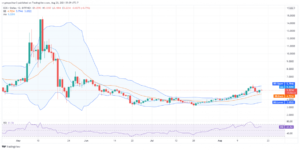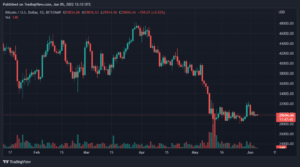
TL;DR Breakdown
- Wells Fargo files for Bitcoin fund with SEC.
- Wells Fargo President revealed Bank would begin crypto service back in May.
- Several other American crypto firm begin offering crypto services.
Top-tier American bank Wells Fargo has finally filed with the Security and Exchange Commission (SEC) to float its own designated Bitcoin fund.
This comes months after the bank considered joining the crypto bandwagon. Wells Fargo now joins JP Morgan to have registered a Bitcoin fund with the SEC.
For Wells Fargo, the American Bank would partner with the New York Digital Investment Group (NYDIG) and FS investment to float its Bitcoin fund.
When Wells Fargo first hinted at Bitcoin
Back in May, during an interview, Darrell Cronk, Wells Fargo president, hinted that the American bank might become the next big financial institution to foray into the crypto sector. He, however, did not reveal which product or what crypto service the firm would provide for its customers.
The American bank crypto filing is another evidence of the growing crypto adoption among banks in the US. It also shows an increasing demand for crypto services among banks.
Other American banks go crypto
Like JP Morgan and Wells Fargo, Goldman Sachs also reactivated its crypto trading desk and filed for a Bitcoin ETF.
BNY Mellon, another US bank, also activated digital asset custodial services for its users. Many other banks also started the same after BNY Mellon.
Another bank, Morgan Stanley, activated access to Bitcoin for its clients through three funds and filed for Bitcoin exposure for its fund.
Many of these banks are reportedly hedging their bets for a potential extinction of banks and traditional finance. They are funneling their funds into crypto and crypto start-ups.
However, JP Morgan and Wells Fargo’s approach to crypto is a very cautious one. When JP Morgan began offering its crypto service to clients, it cautiously asked clients to consider adding crypto to their portfolio, advising that just 1 percent of their allocation could lead to a significant gain in the wake of many other risks.
Source: https://api.follow.it/track-rss-story-click/v3/tHfgumto13B3Pb6bc_QyNbG7Iy_4u0x9
- access
- Adoption
- allocation
- American
- among
- asset
- Bank
- Banks
- Bitcoin
- Bitcoin ETF
- commission
- crypto
- Crypto adoption
- crypto trading
- Customers
- Demand
- DID
- digital
- Digital Asset
- ETF
- exchange
- Finally
- finance
- financial
- Firm
- First
- FS
- fund
- funds
- goldman
- Goldman Sachs
- Group
- Growing
- HTTPS
- Institution
- Interview
- investment
- IT
- jp morgan
- lead
- months
- morgan stanley
- New York
- offering
- Other
- partner
- portfolio
- president
- Product
- SEC
- security
- Services
- stanley
- started
- Trading
- traditional finance
- us
- users
- Wells Fargo
- XML











